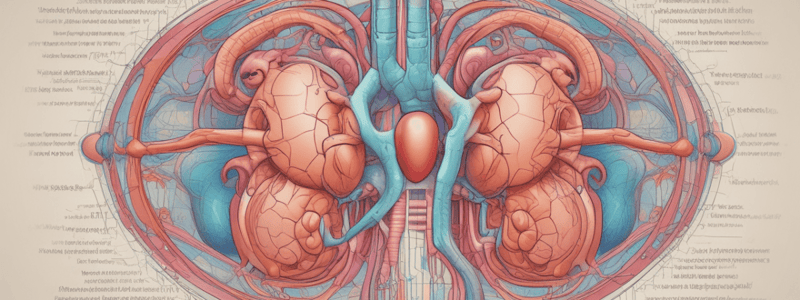Podcast
Questions and Answers
What is the primary role of the hilum in the kidney?
What is the primary role of the hilum in the kidney?
- To facilitate blood filtration
- To allow for the entry and exit of blood vessels, veins, and ureter (correct)
- To regulate blood pressure
- To produce hormones
What is the main function of the nephrons in the kidney?
What is the main function of the nephrons in the kidney?
- To produce hormones
- To regulate blood pressure
- To refine the filtrate and regulate what components the blood needs (correct)
- To maintain blood composition
Which part of the kidney contains the nephrons?
Which part of the kidney contains the nephrons?
- Cortex (correct)
- Hilum
- Renal corpuscle
- Medulla
What is the name of the complex tubular structure that enables the refinement of the filtrate in the kidney?
What is the name of the complex tubular structure that enables the refinement of the filtrate in the kidney?
What is the term for the functional unit of the kidney that is responsible for blood processing?
What is the term for the functional unit of the kidney that is responsible for blood processing?
What is the primary role of the kidney in maintaining blood composition?
What is the primary role of the kidney in maintaining blood composition?
What is the primary function of the renal corpuscle, renal tubule, and collecting duct?
What is the primary function of the renal corpuscle, renal tubule, and collecting duct?
What is the osmolarity of the fluid leaving the proximal tubule?
What is the osmolarity of the fluid leaving the proximal tubule?
What is the main function of the loop of Henle?
What is the main function of the loop of Henle?
What percentage of the plasma entering the kidney is filtered into the nephron?
What percentage of the plasma entering the kidney is filtered into the nephron?
What is the osmolarity of the urine excreted from the kidney?
What is the osmolarity of the urine excreted from the kidney?
What is the primary function of the peritubular capillaries?
What is the primary function of the peritubular capillaries?
The kidney plays a role in maintaining muscle tone.
The kidney plays a role in maintaining muscle tone.
The medulla is the outer pale layer of the kidney.
The medulla is the outer pale layer of the kidney.
The nephron is responsible for the production of hormones in the kidney.
The nephron is responsible for the production of hormones in the kidney.
The hilum is the site where the nephrons are located in the kidney.
The hilum is the site where the nephrons are located in the kidney.
The renal tubule is a part of the nephron that enables the refinement of the filtrate.
The renal tubule is a part of the nephron that enables the refinement of the filtrate.
The collecting duct is responsible for filtering the blood in the kidney.
The collecting duct is responsible for filtering the blood in the kidney.
The renal cortex and renal medulla have the same osmolarity.
The renal cortex and renal medulla have the same osmolarity.
The descending limb of the loop of Henle creates a hyposmotic fluid.
The descending limb of the loop of Henle creates a hyposmotic fluid.
The permeability to water and solutes in the distal tubule is regulated by the nervous system.
The permeability to water and solutes in the distal tubule is regulated by the nervous system.
Only 1% of the plasma entering the kidney is filtered into the nephron.
Only 1% of the plasma entering the kidney is filtered into the nephron.
The fluid leaving the collecting duct is always isosmotic to plasma.
The fluid leaving the collecting duct is always isosmotic to plasma.
The proximal tubule is responsible for the reabsorption of 99% of the plasma entering the kidney.
The proximal tubule is responsible for the reabsorption of 99% of the plasma entering the kidney.
Flashcards are hidden until you start studying
Study Notes
- The kidney has three main areas: renal corpuscle, renal tubule, and collecting duct.
- The nephron is the functional unit of the kidney, responsible for blood processing, and has different types of cells along its length.
- The renal corpuscle has two different kinds: juxtamedullary and cortical.
- The renal tubule is responsible for refining the filtrate through variable reabsorption of water and solutes.
- The proximal tubule has isosmotic fluid, which becomes progressively more concentrated in the descending limb.
- The removal of solute in the thick ascending limb creates hyposmotic fluid.
- The permeability to water and solutes in the distal tubule and collecting duct is regulated by hormones.
- The final urine osmolarity depends on reabsorption in the collecting duct, with a range of 50-1200 mOsM.
- The cortex is isosmotic to plasma, while the renal medulla becomes progressively more concentrated.
- Ions are reabsorbed but no water in the renal medulla, resulting in a range of 300-1200 mOsM.
- Glomerular filtration occurs through the afferent arteriole, with 100% of plasma volume entering the afferent arteriole.
- 20% of the volume filters through the peritubular capillaries, and 19% of the fluid is reabsorbed.
- Bowman's capsule has more than 99% of plasma entering the kidney returning to the systemic circulation.
- The kidney has a functional role in maintaining blood composition, blood pressure, and hormone production.
- Clinically relevant readouts regarding kidney function include blood composition, blood pressure, and hormone production.
- The structure of the kidney consists of the hilum, cortex, and medulla, which contain nephrons.
- Nephrons are complex tubular structures that enable the refinement of the filtrate based on the components the blood needs.
Studying That Suits You
Use AI to generate personalized quizzes and flashcards to suit your learning preferences.



